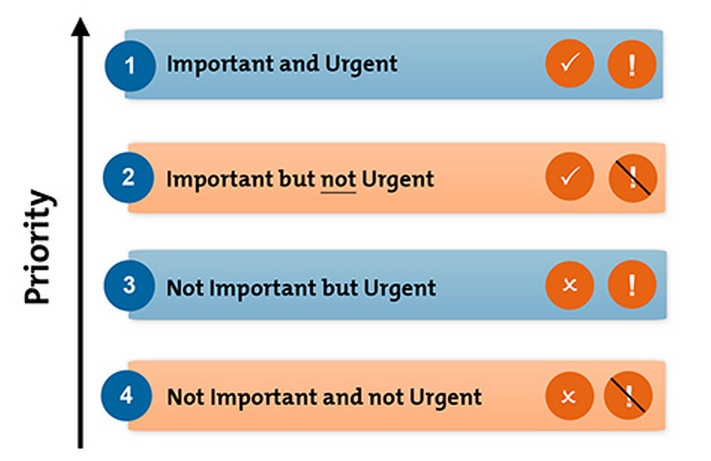Urgent VS Important Task Management With To Do Checklist
Reading Time: 3 minutesImagine you are stressed out at work trying to deal with your current overload when your boss gives you a task to prepare an important presentation for the next board meeting in 2 days. Understanding the fact that your to-do list is already full and you have no time for other urgent tasks makes you feel anxious. Everything seems to annoy or distract you and you cannot concentrate. Determining which tasks are important and which are urgent allow us to deal with what’s essential for our success first. If you will learn this simple technique that works absolutely great with To Do Checklist, you will be able to grow your business or career more quickly.
- Time Stressors are the pervasive sources of pressure.
- Being under stress means too much to do in too little time.
- Is there a way to beat stress? Can you still accomplish the tasks essential for your career?
U.S. President Dwight D. Eisenhower said: “I have two kinds of problems: the urgent and the important. The urgent are not important, and the important are never urgent.”
The “Eisenhower Principle” is used to
- Organize the workload.
- Set priorities!
What Tasks are Important and what tasks are urgent?
Important tasks are the activities that help us achieve our goals.
Urgent tasks are the activities that require immediate attention. But they are associated with achieving someone else’s goals. Urgent tasks demand all your attention.
I.E. Like it or not, we tend to concentrate on urgent tasks because if we fail to react immediately there are severe consequences.
Take your tasks and categorize them under Urgent/Important Principle
Urgent/Important Principle: Categorize your to do list tasks
Urgent and Important Activities.
With many urgent and important tasks, take your time and look at the table to identify your tasks. To do list experts point out that there 2 types of Urgent / Important activities:
- That surface up unexpectedly (unforeseen)
- That left until the last minute (eliminate them by training your planning skills and avoiding procrastination)
Tip #1. Remember, none of us can predict possible task issues, but if you schedule some time to handle unpredicted issues or unplanned important activities, this will help you stay on top of things. (If you see a crisis appearing, reschedule other tasks.)
Important but NOT Urgent.
They include the tasks you set to achieve your goals (personal or professional). The planning requires your time and you will benefit from keeping on track (avoid stress).
Not Important BUT Urgent.
These tasks are the real obstacles on the way to achieving your goals. These tasks require to be delegated or rescheduled. The usual source of these tasks is other people! Say “No” politely and you will encourage them to try and solve issues on their own. (If there are people, who like to interrupt your work to talk about “the problems”, arrange regular meetings).
Not Important & Not Urgent.
These tasks result to be a true distraction! Cancel, ignore or set aside these activities as they do not contribute to your efficiency. They fail to deliver the desired outcome.
All of the above-mentioned steps will help you to concentrate on your activities and keep the clutter out of your mind. Right now identify your urgent tasks and important activities. Open To Do Checklist app and schedule the prioritized tasks. Use share task option to delegate your tasks and you will notice how you get things done much faster than usual. If you have tried this new technique and it worked, let us know as we are thankful for all your feedback!

